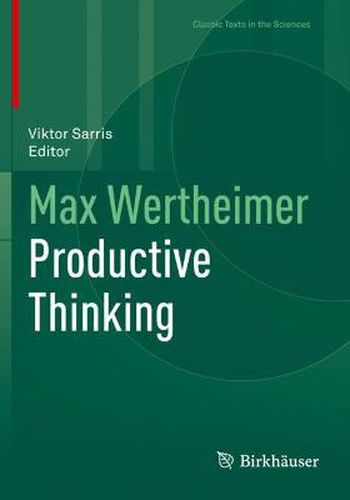Readings Newsletter
Become a Readings Member to make your shopping experience even easier.
Sign in or sign up for free!
You’re not far away from qualifying for FREE standard shipping within Australia
You’ve qualified for FREE standard shipping within Australia
The cart is loading…






This title is printed to order. This book may have been self-published. If so, we cannot guarantee the quality of the content. In the main most books will have gone through the editing process however some may not. We therefore suggest that you be aware of this before ordering this book. If in doubt check either the author or publisher’s details as we are unable to accept any returns unless they are faulty. Please contact us if you have any questions.
Max Wertheimer (1880-1943), a pioneer of 20th-century psychology, had a major influence on the development of cognitive psychology, especially the psychology of perception and of productive thinking. His work Productive Thinking (1945), written in New York, is regarded as a milestone in creativity research. Consisting of many examples of creative thought processes - from geometric tasks to socio-psychologically relevant conflict resolutions to the development of Einstein’s theory of relativity - the book leads the reader through a multi-faceted body of thought in the psychology of thinking.
Only a few texts in psychology have remained significant even after a period of three quarters of a century - Max Wertheimer’s Productive Thinking is such an exception. This book, which also presents an exposition of Gestalt psychology, highlights the productive (insightful) versus automatic (unreflected) thought processes for many areas of life. In addition to examples from school teaching, the chapter on the emergence of Albert Einstein’s theory of relativity is of lasting interest to today’s generation of psychologists, pedagogues, brain researchers, neuroscientists and philosophers. Wertheimer had the unique opportunity to analyze Einstein’s thinking in direct conversation. An introductory commentary by Viktor Sarris for this new edition of the first publication of Productive Thinking in 1945 offers a detailed account of the genesis and reception of Wertheimer’s work.
$9.00 standard shipping within Australia
FREE standard shipping within Australia for orders over $100.00
Express & International shipping calculated at checkout
This title is printed to order. This book may have been self-published. If so, we cannot guarantee the quality of the content. In the main most books will have gone through the editing process however some may not. We therefore suggest that you be aware of this before ordering this book. If in doubt check either the author or publisher’s details as we are unable to accept any returns unless they are faulty. Please contact us if you have any questions.
Max Wertheimer (1880-1943), a pioneer of 20th-century psychology, had a major influence on the development of cognitive psychology, especially the psychology of perception and of productive thinking. His work Productive Thinking (1945), written in New York, is regarded as a milestone in creativity research. Consisting of many examples of creative thought processes - from geometric tasks to socio-psychologically relevant conflict resolutions to the development of Einstein’s theory of relativity - the book leads the reader through a multi-faceted body of thought in the psychology of thinking.
Only a few texts in psychology have remained significant even after a period of three quarters of a century - Max Wertheimer’s Productive Thinking is such an exception. This book, which also presents an exposition of Gestalt psychology, highlights the productive (insightful) versus automatic (unreflected) thought processes for many areas of life. In addition to examples from school teaching, the chapter on the emergence of Albert Einstein’s theory of relativity is of lasting interest to today’s generation of psychologists, pedagogues, brain researchers, neuroscientists and philosophers. Wertheimer had the unique opportunity to analyze Einstein’s thinking in direct conversation. An introductory commentary by Viktor Sarris for this new edition of the first publication of Productive Thinking in 1945 offers a detailed account of the genesis and reception of Wertheimer’s work.